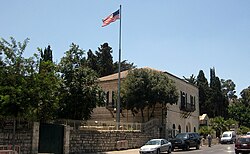History
The U.S. consulate first opened in 1844 in the Old City, inside Jaffa Gate, in what is now the Swedish Christian Study Center. In the late 19th century, the consulate moved to a site on the Street of the Prophets. In 1912, it moved to Gershon Agron Street, in present-day West Jerusalem. The main building, one of the first houses built outside the Old City walls, was constructed in 1868 by Ferdinand Vester, a German Lutheran missionary. A third story was added later. On 23 May 1948, the Consul General, Thomas C. Wasson, was assassinated. In 1952, the consulate leased a second building which provided American citizen and visa services on Nablus Road, East Jerusalem. [9]
Trump Administration and US Embassy
On 14 May 2018, the new embassy of the United States in Jerusalem opened on a small part of the Arnona site of the Jerusalem Consulate General, and became the new diplomatic mission of the United States to the State of Israel, replacing the former embassy of the United States in Tel Aviv. [1] [2] Of the 1,000 employees at the Tel Aviv embassy, about 50 transferred to the Jerusalem embassy. [10]
The Consulate General continued to operate as an independent mission from its historic Agron Road site. [2] The opening of the Jerusalem Embassy took place on the 70th anniversary of the formation of modern Israel. Palestinians protested the relocation at the border, during which more than 40 Palestinians demonstrators were killed. [11]
Merger into US Embassy
On 18 October 2018, the U.S. Secretary of State Mike Pompeo announced that the US would be merging the US Consulate General with the newly-relocated US Embassy in Jerusalem into a single mission. Pompeo also announced that the US would continue to conduct its reporting, outreach and program in the Palestinian Territories through a new Palestinian Affairs Unit inside the US Embassy in Jerusalem. This unit will operate from the Agron Road site in Jerusalem. [3] While the announcement was welcomed by the Israeli Government, Palestinian officials accused the Trump Administration for supporting Israel's claim to Jerusalem. [12] [13] [14] [15]
On 19 February 2019, it was reported that the US Consulate General would be merging into the US Embassy in March 2019. [16] [17] [18] On 4 March 2019, the functions of the consulate general were merged into the US Embassy and the consulate general ceased operating, ending the US practice of having separate diplomatic missions to the Israelis and Palestinians. The former Consulate General's Agron Road building was renamed the Palestinian Affairs Unit, to carry out many of the former Consulate General's functions. The last Consul-General was Karen Sasahara. [4] [5] [6] [7]
In response to the Consulate General's merger into the US Embassy, Saeb Erekat, the secretary-general of the PLO's Executive Committee urged the international community to boycott the new Palestinian Affairs Unit. [19] [20] [21] Meanwhile, fellow Executive Committee member Hanan Ashrawi called the closure of the Consulate General "an assault on Palestinian rights and identity." [22]
Location
The US Consulate General was located on 18 Gershon Agron Street and once operated a consular section on 14 David Flusser Street, Arnona in West Jerusalem. [25] Until 2010, citizen and visa services operated out of the building at 27 Nablus Road in East Jerusalem. [9] In October 2010, consular services were moved to a new building complex (just east of the Arnona neighborhood of West Jerusalem) bisected by the Green Line and thus partly in what was defined in 1949 as No Man's Land. [26]
On May 14, 2018, the new US Embassy in Jerusalem moved into the Arnona consular section annex compound of the Jerusalem Consulate General which continued to exist. The space now houses the Ambassador and a small staff. The Ambassador splits his time between the two locations. The remaining embassy functions are to be conducted out of the former Tel Aviv Embassy now officially referred to as a branch office of the embassy. Most consular functions of the still previous consulate now operate under Embassy authority. [1] [2] The embassy compound is located on a parcel of land that straddles the unsettled boundary Green Line into a No Man's Land so designated at the 1949 armistice agreement between Jordan and Israel that ended the 1948 Arab-Israeli war. [27] [28]
This page is based on this
Wikipedia article Text is available under the
CC BY-SA 4.0 license; additional terms may apply.
Images, videos and audio are available under their respective licenses.


